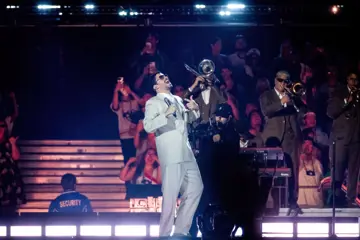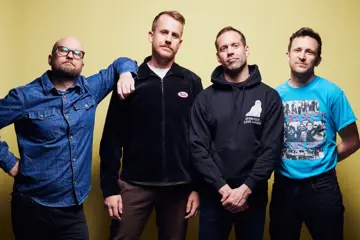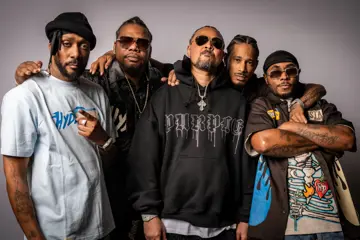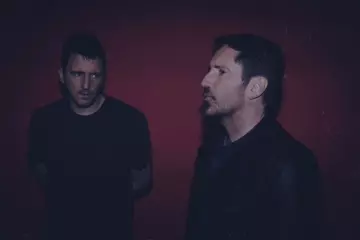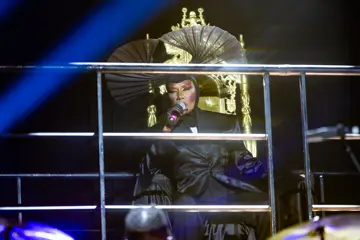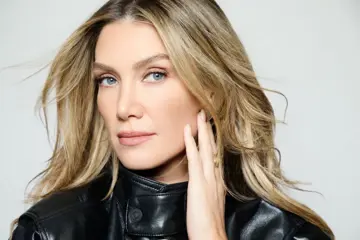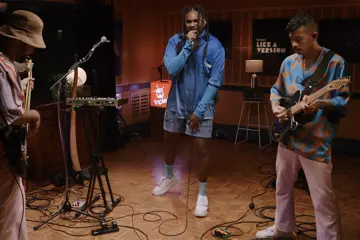Big Day Out founder Ken West has penned an open letter addressing the state of the arts industry amid the COVID pandemic and what the future might hold for live music, festivals and beyond in Australia.
With many unsure as to when major events will return and the Health Department stating it's too early to speculate, the festival juggernaut has stated that priority will likely be given to local community events first over destination events.
“The best chance a major festival would have to get a green light would be as a test event,” West said.
“It might require everyone entering to be registered, COVID tested and have the app to see if it works on a large scale. Governments love tests and PM Scomo openly wants everyone, especially cynical young people, to download the COVID app."
West goes on to state that “anything this side of 2020 will battle to get clearance”, which might “not a bad thing for now”.
“Pubs, clubs and theatres have been struggling for years from a glut of events and festivals,” he said.
“They employ a lot of people, cater for locals and desperately need support to stay in business. Maybe it wouldn’t hurt festivals to have a break from the market as well.”
With international travel up in the air – and with it the potential for local festivals to boast international headliners – many events are turning their sights to all-Aussie line-ups, with Falls Festival announcing earlier this week its 2020/2021 events will consist of only local acts.
“This can be a great time for supporting Australian and soon New Zealand artists at least until the borders re-open, hopefully longer,” West said.
Don't miss a beat with our FREE daily newsletter
Despite no end on Government restrictions around mass gatherings amid the pandemic, a recent triple j poll revealed that 57% of punters would still attend music festivals before a COVID-19 vaccine is created.
Splendour In The Grass is just one of the major festivals scheduled to go ahead before the end of the year, with The Gum Ball, VDMfest Rock Edge Country Music Festival and more also set to take place around October, while a number of tours have been rescheduled around that same time.
Read Ken West's full open letter below.
What next for the arts and entertainment business?
If it’s a war, it’s a cold war or worse, a new war on terror.
In other words; don’t hold your breath for a ‘War is Over’, dancing in the streets moment.
We now need to confront the scared and scarred new world and begin to crawl our way out of the COVID-19 swamp now that the new realities are becoming clear. We all carry with us the whirlwind of emotions generated by endless news cycles, lockdowns and dealing with the harsh realities still ahead. With an uncertain future and a cataclysmic financial period still to come it's going to be a bumpy ride. As for the arts, it will be like standing up on a rollercoaster, more fear than cheer.
So, as we are facing our next recession and since I survived and thrived the last two events (1982 & 1991) it might be important to look back at the similarities and differences. The past may enable a more accurate prediction of what is to come and what the arts might require to be back on track.
Then it was high interest rates, high unemployment and credit crunch.
Now it’s low interest rates, high unemployment, substantial stimulus and a pandemic.
So back to past events as I remember them.
Ironically, I had forgotten that the past two recessions were productive, creative times.
In 1982 Nick Cave and I shared the same dole day yet Nick was on the cover of NME and I toured New Order the same year.
Then in 1991 the first Big Day Out went on sale and that worked out pretty well.
So, while then vs now seems very different, the recovery will have similarities.
During those times the dole bludger stigma didn’t stick. With over 10% unemployment nationally and well over 20% for under 25s, everyone was affected. A substantial amount of the unemployed were professional, skilled and well educated. There were few real jobs on offer with small business risk let alone cash flow stifling confidence. For many, once you finished your tertiary degree it was straight to the dole cue. At least university fees were zero or low then... but not now.
This led to rapid growth in young people stuck at the family home, bored, poor, angry and looking for a different path to ‘waiting for things to get better’. It quickly became apparent that you needed to create a job, not find one. And what better than the dream of a paid social life in the arts.
In 1991, leading up to the first Big Day Out, there were few commercial arts events, especially music festivals. Part of that reason was a thriving pub rock scene, low numbers of international tours (partly due to the low AU$) and a healthy government arts funding program that satisfied the market. Governments and councils sponsored free community events and paid staff, artists and technical support teams. In the early '80s commercial radio and Double J were presenting free concerts in parks and at beaches. No one was greedy and overheads were low.
Over time commercial events that needed no direct financial government support changed the landscape including arts and entertainment funding.
Sadly, taxpayer-funded cultural and music events slowly shifted from community to become more government branding exercises. At the same time, state governments and councils started charging events for everything from user pay police to street cleaning, fire brigade, ambulance and substantial occupational health and safety requirements and certification fees. In NSW they started making events absorb the cost of free transport as part of the ticket price. All this started adding up to be a big part of the costs which pushed up ticket prices as well as the breakeven figure. Higher risks, less returns and little room for error.
As I see it, the current NSW govt have been destroying Sydney nightlife and music events systematically for years which doesn’t bode well for future plans.
In general, governments have been quietly sponging off the work of passionate, creative, risk-taking individuals for a long time and now it appears the ‘Golden Goose’ is cooked...
No more free eggs…
This brings me to now.
It is clear that large public events involving unrestricted audience movement, close contact, food fairs and portaloos, especially for entertainment, will be last on the list. It might be a battle just to get on the list.
Endless monitoring and rapid result testing might just become part of everyday life until a medical solution is achieved.
So, once we have test run schools, churches, malls, gyms and restaurants without relocking them down, sport will be the overwhelming focus for govt to get back on track.
After all, in Roman times Circus Maximus was created to distract and entertain the people just enough to stop them from rising up and killing their leaders.
The present ‘need’ to see gladiators back in the ring (with or without audience) is as much about keeping the money rolling with broadcast rights and betting as it is with distracting/rewarding the masses/voters.
As for live entertainment, it’s a much tougher path forward. First to close, last to reopen.
Initially, reserve seated events such as sport, theatre and concerts should slowly start back up again. As for cinemas, it might be a futile effort.
Eventually, bars, nightclubs and GA events will be liberated and finally multi-day large camping festivals will return depending on travel restrictions, testing capabilities and cures.
As for the timeline... How long is a piece of string?
From experience, any event that requires a Development Application to take place will be confronted with an overly cautious approval process. A real person has to sign a legal document that approves the plans for the event and more importantly, public safety.
If they get it wrong, they might be fired and publicly shamed. Not many council/public servants will take the risk unless there is an obvious upside and/or substantial community and media support. The reasoning, of course, is to spread the blame if anything does go wrong.
So, what entrepreneur wants to risk the house on a ticketed event that might not happen at a time of high unemployment and a lack of consumer confidence coming out of a pandemic?
Consumer decisions will be based on mob mentality. We have been programmed to fear contact so for quite a while the mob will be spooked. The youth market, of course, won't care, demand will be strong as long as old people don’t ruin the party… again.
Few people in Sydney would remember that in the late '80s, thanks to resident action groups and weak government, outdoor concerts were not permitted. It took Simon & Garfunkel in late '91 to break the drought by selling out two cricket grounds without a permit. That and the introduction of proper sound guidelines and monitoring enabled outdoor concerts and events like the Big Day Out to be staged. Once monitoring went digital the complaints slowly disappeared. The music industry worked with government to solve the problem. For example, I actually wrote the first festival EPA conditions in 1993. Instead of 70dba for a five-hour concert, I proposed 65dba for a 10-hour festival. Problem solved.
The point of this is that as an industry WE need to present a plan to government on how we can manage this situation and why the audience and industry positives out way the public risk. I’m sure cruise companies are building their case for restarting. Let’s hope festivals are back before cruise ships.
So, let’s look at the most damaged sectors of the live performing arts.
Venues, technicians, artists, producers, production and marketing companies are all waiting for a glimmer of hope to start the roadmap back to the newer new normal.
So, as each stage of the unlocking rolls out keep in mind that this is all being made up as they go along.
And if you do have a pub or venue or a festival forget about what your license or permit conditions were and look at the only OH&S issue that matters right now.
1 - What level of health risk your activity poses?
2 - What plans do you have in place to stop transmission of COVID-19?
3 - Why should you be allowed to operate?
4 - Do the benefits out way the risks?
What they will be looking for is minimum face to face interaction which goes against the purpose of gatherings. And in all cases, even if separated, they all share toilets.
The logical order for reopening to me looks like:
1 - Theatres can work as the audience face the stage and have specific seats.
2 - Pubs and clubs can monitor social distancing with limitations.
3 - General admission Live music and nightclubs will have trouble as people cluster.
4 - General admission Festivals and Dance parties have no chance in controlling interaction enough to satisfy current requirements.
Reopening will most likely focus on local community and not destination events while the pandemic controls the game.
The best chance a major festival would have to get a green light would be as a test event. It might require everyone entering to be registered, COVID tested and have the app to see if it works on a large scale. Governments love tests and PM Scomo openly wants everyone, especially cynical young people to download the COVID app.
Even then, international travel needs to normalise, tourism needs to open plus the audience need to accept the new, new, normal. Anything this side of 2020 will battle to get clearance.
But maybe that’s not a bad thing for now. Pubs, clubs and theatres have been struggling for years from a glut of events and festivals. They employ a lot of people, cater for locals and desperately need support to stay in business. Maybe it wouldn’t hurt festivals to have a break from the market as well.
That means once this debacle evolves into rebuild hopefully the following might happen.
Federal Government keeps unemployment benefits at the new rate for a year, not six months before re-evaluation.
State Governments and councils hire industry professionals to oversee and directly fund free localised community events plus absorb or remove additional charges to commercial events.
Venues, clubs and pubs are supported by music and entertainment programmes.
Commercial sponsors increase support by moving online advertising money over to live event support.
Ticketed events should only go on sale once approval is granted and refunds are guaranteed.
Hopefully most of this and more will happen; we will see.
On a positive note, this can be a great time for supporting Australian and soon New Zealand artists at least until the borders re-open, hopefully longer.
Good luck everybody.
Best,
Ken West






